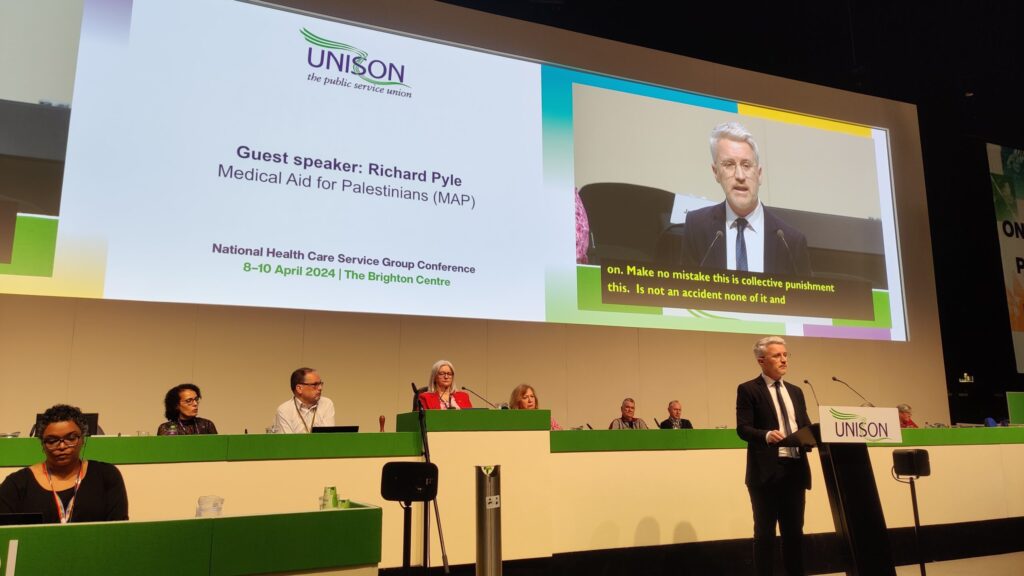The debate on Agenda for Change pay merged into terms and conditions as business continued into the afternoon at health conference in Brighton.
Paying to work
First up were a group of motions that explored the various ways in which health workers are losing out financially in the course of their work. This included paying for their own uniforms, DBS checks, paying for hospital parking – with one delegate even saying her employer asked for staff to pay for their key-fobs.
Elsewhere motions discussed out-of-date mileage and subsistence rates with the mover of the mileage motion, Trudy Martin of the SGE, noting that: “HMRC rates haven’t changed since 2011 and workers are paying the price” and that if rates kept up with inflation, it should be 63p a mile, not 45p.”
Meanwhile, a speaker on the motion about inadequate subsistence rates said: “if the £15 dinner allowance had risen in line with inflation from 2004 to 2024, it would be worth around £28 now.”
NHS Bank workers
An NHS staff bank is an entity managed by a trust, or third-party organisation who contract healthcare professionals to take on temporary shifts at hospitals.
Often, those working on bank contracts often have inconsistent pay terms and conditions outside of the Agenda for Change pay framework.
One motion noted that the framework agreement for the 2018 three-year pay deal required the NHS Staff Council to explore the scope for a collective framework agreement on bank and agency workers.
As the mover, Jim Clawson, noted: “That was six years ago.”
Trudy Martin of the SGE added: “Employers are using bank contracts more than ever before, making people take up zero-hour contracts without good terms and conditions.
“While bank contracts may work for some people in specific circumstances, they are often not the most appropriate way to solve the problem.”
The motion called on the SGE to work with the staff council to finally deliver the promised framework agreement to ensure that Trusts treat their bank staff in a fair, consistent and equitable manner.

A shorter working week – better for patients, better for staff
Bryn Webster introduced the next motion, saying: “Reducing the working week with no loss in pay has been a UNISON goal for years.
“And the recent UNISON survey showed that a reduction in the working week was a top priority for members.”
He noted that 45% of NHS staff had felt unwell as a result of work related stress over the last 12 months, and more than 15 million working days were lost due to stress last year.
Jennifer Dutton (pictured, above) a call-handler with North West Ambulance service said: “Our mission statement for this entire conference is one team for patient care and this motion has the chance to do that.
“I regularly see fellow call handlers with red bulls and coffees in their hands, ready to fall asleep at their desks.
“How can my first call on day one possibly be as good as my last call on my tenth day straight? Patient care is at risk and we deserve a break.”
A nurses-only pay spine
The final motion in the section was an emergency motion called Divided we fall – invest in Agenda for Change, don’t destroy it.
It noted that the Department for Health and Social Care recently launched a consultation to “consider the benefits and challenges of a separate pay spine for nursing staff.”
The consultation put forward two options, one keeping nurses on the Agenda for Change job evaluation system, but giving them a different pay spine and the second where nursing staff would be given an entirely different and separate set of terms, conditions and pay and bargaining structures.
Eddie Woolley of the SGE (pictured, top) moved the motion saying: “Both of these options are unacceptable.”
He argued that they are aimed at dividing the NHS workforce weakening them as a result, and that it “could lead to other staff groups asking to be treated differently, which could mean the end of Agenda for Change.
“And let’s remember why we worked for Agenda for Change – it’s about pay and equality, it isn’t perfect. Banding for nurses has never rewarded clinical experience, but we need to remain united not divided, we are one team, we are UNISON.”
The article Health conference: Divided we fall first appeared on the UNISON National site.
